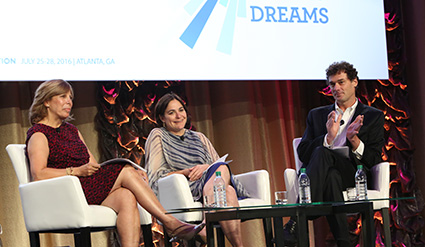Hadassah
Feature
Defining Zionism in a New Age

All registered conventiongoers proudly sported “I’m a Zionist” ribbons on their nametags—emphasizing Hadassah’s role as The Women’s Zionist Organization of America. Zionism also claimed center stage at the plenary session “What Exactly Does Zionism Mean to You?” featuring the divergent views of Caroline B. Glick, senior contributing editor at The Jerusalem Post, and Rob Eshman, publisher and editor-in-chief of the Jewish Journal of Greater Los Angeles. The session was moderated by Linda Scherzer, journalist and former Mideast correspondent for CNN.
“For Israelis, we live Zionism,” said Glick, 46, who followed the dream she had at age 12 to move to Israel. She now lives in Efrat. “I urge all of you to consider aliyah,” said the author of the 2014 book The Israeli Solution: A One-State Plan for Peace in the Middle East.
Eshman, 56, described himself as “a 1967 baby” because of the indelible impression the Six-Day War made on him. He recalled feeling “home” the first time he visited Israel: “I connected to my soul, I connected to the people and I connected to my destiny.”
The panelists discussed their differing levels of concern over what Glick labeled the crisis of the American left and its support for Israel. They also shared their prescriptions for a one-state solution, two-state solution or some confederation of nations to resolve the political impasse. But Glick and Eshman agreed on one thing: It’s important to spend time and money telling your story to the next generation, teaching them about Judaism and Zionism.
The panel discussion at Hadassah’s 98th national convention will be added to Hadassah’s “Defining Zionism” web-streaming series, which provides free videos of engaging speakers talking about Zionism from their perspective. The aim is for these scholars, activists and community leaders to inspire new ways of thinking about Israel and Zionism and to spark local discussions that will contribute to greater involvement in one of Hadassah’s priorities. Hadassah is also sponsoring, in partnership with The Jewish Week in New York, live “Defining Zionism” programs. The next one will feature human rights attorney and pro-Israel activist Brooke Goldstein, on September 12, at the Temple Emanu-El Skirball Center.
What Does Zionism Mean To You
Convention participants had their own views on the topic. Here is a sampling.
“Zionism in my grandparents’ generation was about having a country. Zionism in my parents’ generation was about building a country. Zionism in my generation is about creating a country that is tolerant and in peaceful relations within and without and understanding how it can be.” —Naomi Katz, 39, Moshav Amirim, Galilee, Israel
“It means you support Israel, believe it’s the homeland of the Jewish people. Support it with your heart, with your mind, with your money.” —Gina Maling, 58, Chicago, Ill.
“It’s an understanding of what Israel is all about. Israel is a refuge, a place of excitement and innovation. There’s a diversity of Jewish life, a little bit of everything. It’s home to all.” —Sue Appelbaum, 75, San Diego, Calif.
“At first Zionism scared me, I had no idea what it was. My conversion class had a lot about Israel but we needed to be educated on what Zionism actually means. Even my Jewish peers knew nothing about it. I am now definitely a Zionist. As long as people are dying for being Jewish, Israel is needed. We need a safe place, we need a home.” —Delaney S. Rieke, 32, Los Alamos, N.M.
“It is connection with my grandparents, my history. It is the manifestation of my commitment to the Jewish people. By being able to have an impact on Israel, I have successfully connected my children to their roots and people. Zionism has allowed that to be part of our lives.” —Marcie Natan, 71, New York, N.Y.
“For me, it’s a connection to what I believe the idea of Israel is really all about. A country that is so little but does so much for the rest of the world. I have a deep connection to wanting to help heal the world, and I feel it’s through Israel that we can do that.” —Bonnie Boring, 52, Knoxville, Tenn.
“When I graduated from Hebrew school, I gave a speech on what the State of Israel meant to me. I said I believed Israel is the building block to the future of the Jewish people. I think Israel isn’t only for Jewish people, but for the whole world. We’re seeing that played out, how Israel’s innovation is transforming the whole world.” —Edie Barr, 68, Ramat Beit Shemesh, Israel









 Facebook
Facebook Instagram
Instagram Twitter
Twitter
Leave a Reply